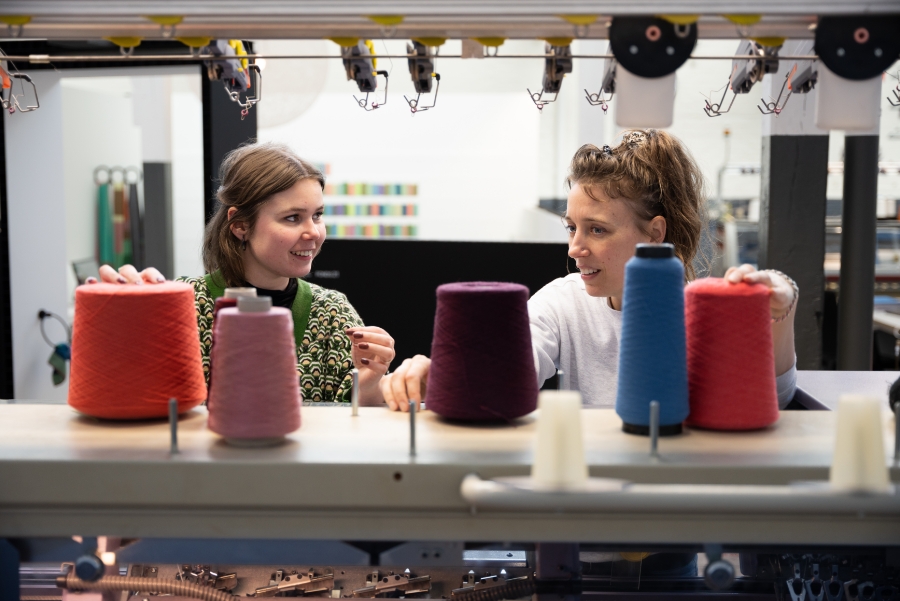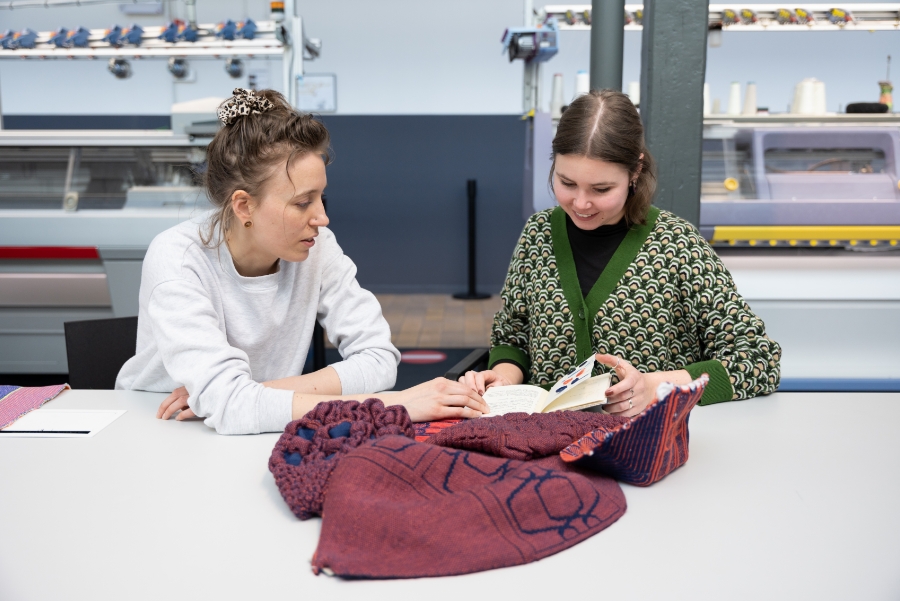For the past six months, intern Lynn Biesmans has been helping out with innovative development projects in the TextielLab as part of her course. After the summer she wants to submit a graduation application for the knit-to-shape project she started during her internship: “I’ve only scratched the surface of what’s possible here.”
Offering internships in all techniques, the TextielLab bridges the gap between vocational training – both HBO and MBO – and practice. By working alongside the professionals in the lab for several months, interns learn the tricks of the textile trade and quickly become familiar with the world around it. Interns experience all aspects of the development process: from a designer’s initial idea to the elaboration of the concept, the supplementary research in the Sample Studio and museum collection, the process of choosing yarns and techniques, the collaboration with product developers and technicians, and the finishing and presentation of the final product.
Intern becomes supervisor
“We see interns as fully-fledged employees,” says Hebe Verstappen, head of the TextielLab. “As an intern, you even take part in the vision meetings, during which we discuss whether to accept a project or not.” She stresses that as an intern you essentially become a supervisor. So, you must enjoy shaping someone else’s idea and learning from it. But that learning goes both ways: the lab team welcomes the input of a new generation of designers. For example, the assembly department recently bought a sewing machine with a special foot, after an intern from the ROC described what it can do. Students are also often well informed about new sustainable materials, which our yarn specialist is always interested in hearing about.
“We see interns as fully-fledged employees.”
Best training company
The lab team is proud to have been named one of the top three best training companies last year. “We are really set up as a training institution,” says Verstappen. “Because we are supported by the government, we can offer opportunities to learn on the job. We support individual development, without the performance pressure of a commercial company.” That does not alter the fact that the interns who work here are highly motivated. Lynn Biesmans, who is studying at the Academy of Fine Arts and Design in Maastricht, knew after her first visit to the lab that she wanted to do an internship here. She was so inspired by the one day she spent making samples on the weaving and knitting machines that she was even prepared to extend her studies by six months. In December, she joined the knitting department, where she has been involved in all the daily activities for almost half a year.

Intern Lynn Biesmans with product developer Sarena Huizinga. Photo: Patty van den Elshout
Learning from the pros
“I’ve learned so much here,” says Biesmans. “How the museum runs, how to operate the machines, how to work in a team, and how to repair and finish a product beautifully.” During her internship she experienced the entire development process of two of Sangmin Oh’s ‘Knitted Lights’, which he recently presented in Milan. But she also contributed to Jef Montes’ dress made of recycled plastic and to the throws by Sigrid Calon and Simone Post for our in-house label, which is sold in the museum shop. And wherever they could use her help: from flat knitting and circular knitting to the sock knitting machine. “The great thing is that people genuinely wanted my feedback; I was involved in decisions.”
“Pushing the limits on the machine is fascinating to me.”
Intern development days in the lab
Although interns in the TextielLab do not receive an allowance, they do receive something that would otherwise be unaffordable for students: development days in the lab, during which they can work on their own projects. Biesmans seized that opportunity with both hands, starting her own knit-to-shape research project, supervised by product developer Sarena Huizinga. She wants to make larger shapes for interior applications using a combination of wool and melting yarn, which is already filled with remnants of polyester on the flat knitting machine. “The filling on the machine gives a kind of firmness I wasn’t familiar with,” says Biesmans. Intrigued by the possibilities, she wants this to be the focus of her graduation project: how to convert a 3D-knitted shape into a ‘fully-fashioned’ piece of furniture that does not need any finishing. This is a sustainable approach to making furniture that requires less material and eliminates residual waste.

Intern Lynn Biesmans with product developer Sarena Huizinga. Photo: Patty van den Elshout
Coming home
Based on the samples she made during her internship, Biesmans is now adapting her design. After the summer, she wants to apply to develop the idea further in the lab. “The TextielLab offers a perfect mix of research, technology, materials and art,” she says. “Pushing the limits on the machine is fascinating to me. And the team’s enthusiasm is contagious; they rarely say no. It’s a very inspiring place. When I walk in, it feels a bit like coming home.”
Interested in an internship at the TextielLab? Go to textiellab.nl/en/internships/